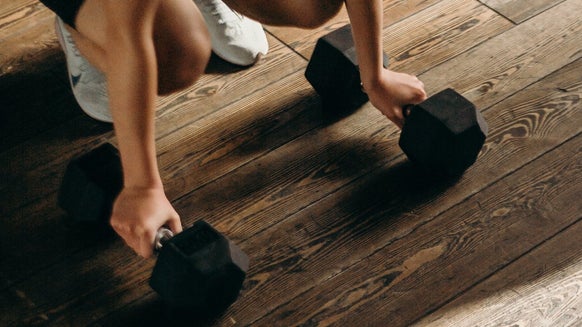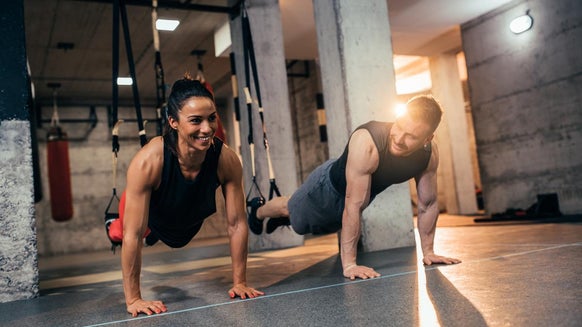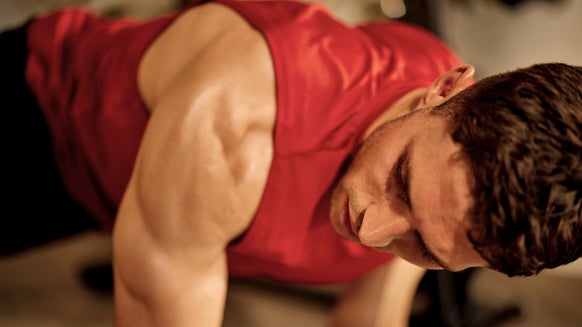4 Bodyweight Workouts to Build Muscle | 16 Essential Exercises at Home

Just because the gym is shut, or you may not have a lot of exercise equipment at home, this shouldn’t put you off from achieving your fitness goals. In fact, with the right attitude, you can still stay ahead of the competition with just bodyweight workouts. Sometimes taking it back to basics is the best thing you can do to improve your strength, flexibility and cardiovascular fitness.
Bodyweight workouts are very effective. You don’t need a gym, loads of space, or even equipment. You can get your heart rate up and muscles working just with a bodyweight workout.
In this article, you'll find:
Bodyweight Push Workout At Home | Shoulders, Chest & Triceps
We’ve joined forces with functional fitness pro & founder of Battle Cancer, Scott Britton, to bring you this bodyweight push workout at home. No weights needed to feel the burn with this one! Featuring 3 key moves to make sure you’re targeting a full range of muscles, this 9-minute blaster is ideal to work into your home workout routine.
Bodyweight Leg Workout
1. Jump Squats
Adopt a squat position Squat down as low as you can with your arms by your side Explode upwards, firing through your quads and glutes, and get as high as you can Land in the squat position and repeat.
We recommend 4 sets of 10 reps to get the most from this exercise.
2. Reverse lunge
Stand upright, with your hands by your hips. Take a large step backwards with your left foot. Lower your hips so that your right thigh (front leg) becomes parallel to the floor, with your right knee positioned directly over your ankle. Your left knee should be bent at a 90-degree angle. Return to standing by pressing your right heel into the floor and bringing your left leg forwards to complete one rep. Alternate legs, and step back with your right leg.
We would advise doing 4 sets of 20reps (10 reps per leg)
3. Jumping Lunge
Stand with your feet shoulder-width apart, with your core engaged. Lunge forward with your right leg, with your arms by your side. Allow your front leg to become parallel to the floor, with your right knee positioned directly over your ankle. Jump up, quickly switching the position of your feet while mid-air so that your right leg moves back behind you and your left leg comes forward. To help you move explosively, propel your arms into the air while you jump. Gently land back on the floor in a basic lunge position, with the opposite leg forward.
We recommend performing 4 sets of 10 reps
4. Bodyweight Squat
Set your feet shoulder-width apart, toes slightly turned out. Pull in your lower abs and keep your eyes forward. Slowly bend at the knees and drop your hips to lower your body. Keep your heels flat on the floor. At the bottom of the exercise movement, pause for a moment and strongly push back up to the starting position, mirroring the descent. - Repeat for the desired number of reps
5. High Knees
Stand with your feet hip-width apart. Lift your left knee up to your chest. Switch to lift your right knee to your chest. Continue the movement, alternating legs and moving at a sprinting or running pace.
Complete 4 sets of 20 reps to get the most out of this exercise.
Bodyweight Chest Workout
1. Push-Ups
Lie face down on the floor with your hands shoulder-width apart. Lift up to a fully extended arm position. Your feet should also be shoulder-width apart. Your body should form a straight line without sagging at the hips. Lower yourself down to the floor, moving in a perfectly plane position. Go down until your nose touches the floor. Keeping your core tight and your body perfectly flat, push back to the start position.
For this exercise, we would recommend doing 4 sets of 10 reps.
2. Pike Push-Ups
Assume a normal push-up position. Now lift your butt up slightly so that your arms are at a 25-degree angle to your torso. Lower yourself down so that your chin touches the ground. Exhale as you push back up, making sure that you don’t allow your butt to lift too high.
You should be aiming for 4 sets of 10 repetitions.
3. Plank Get Ups
Assume a plank position with your feet together and arms extended shoulder-width apart. - Drop your elbows to the floor one at a time to be in a standard plank position.
- Push back up so your arms are fully extended again.
Do as many reps as possible in 30 seconds and try to resist the urge to push towards your backside. Keep your body in line and your core tight.
You should aim for 4 sets of 30-second intervals.
4. Decline Push Up
Supporting yourself with your hands below your shoulders, ensure your feet are elevated on a chair. Walk your hands out until your body forms a 45-degree angle from the floor. Lower your chest down to the floor to feel a strong expansion of the pecs. Push back to the start position.
We’d advise performing 3 sets of 5 reps for this exercise.
5. Diamond Push Up
Get on all fours with your hands together under your chest. Position your index fingers and thumbs so they're touching, forming a diamond shape. Extend your arms so that your body is elevated and forms a straight line from your head to your feet.
We recommend 3 sets of 10 repetitions.
Bodyweight Ab Workout
1. Bicycle Crunches
Start by lying on the ground, with your lower back pressed into the floor and your head and shoulders raised slightly above it. Place your hands lightly on the sides of your head, and lift one leg just off the ground and extend it out. Lift the opposite leg and bend your knee towards your chest. As you do, twist your core, so the opposite arm comes towards the raised knee. Lower your leg and arm at the same time while bringing up the opposite two limbs to mirror the movement.
2. The Crunch
Lie down on your back and plant your feet on the floor, hip-width apart. Bend your knees and place your arms across your chest. Contract your abs and inhale. Exhale and lift your upper body, keeping your head and neck relaxed. Inhale and return to the starting position.
3. V sit-up
Lie on your back with your legs straight up off the floor. Your arms should be extended above your head, and your hands touching the floor. This is the starting position. Bring your body to a "V" shape by lifting your torso towards your legs, keeping both your legs straight and your arms extended.
4. Mountain Climber
Get into the top of the push-up position. This is the starting position. Keeping your back in a straight line, bring your right knee towards your chest, then quickly bring it back to the starting position. Now, bring your left knee in towards your chest and return to starting position. Now speed up the movement, alternating legs quickly, as if you are running in place with your hands on the ground.
5. Leg Raises
Lie on your back, legs straight and together. Keep your legs straight and lift them all the way up to the ceiling until your butt comes off the floor. Slowly lower your legs back down till they're just above the floor and hold this position for a moment. Raise your legs back up and repeat the exercise.
6. Burpees
Targeted Muscles: abs, lower body and glutes
- Starting in a plank position, keep your feet shoulder width apart.
- Bend your knees and jump your feet inwards towards your upper body so you land in a squat position.
- From the squat, keeping your tummy tight, jump up as high as you can.
- Land back in a squat position on the floor, jump back into the plank position and repeat for as many repetitions as necessary.
Take-Home Message
Working out from home can be super effective. There is no reason why you can’t achieve the physique you want, all from the comfort of your own home. All you need is a little determination for a successful bodyweight workout.
How far can you push yourself? Don’t be afraid to add more sets and reps if you need to.








